Text
Hera: Dionysus is an embarrassment
Zeus: Excuse me that's my son you're talking about.
Hera: Yeah exactly, how the hell are you not embarrassed by your son? He's girly, he's always drunk, he wears a ribbon in his hair for gods' sake! He always hangs out with women, because he may as well be a woman. If he were MY son--
Zeus: You know what Dionysus did just the other day? HE CONQUERED INDIA, THAT'S WHAT!
Hera: ...
Zeus: He led the king away in chains! They barely put up a fight! He captured war elephants! WAR ELEPHANTS, HERA!
Hera: ...
Zeus: And he did it while drunk! With a bunch of women as his army! With ribbons in his hair!
Hera: ...
Zeus: And no one dares to challenge him, because he'll bind them in vines or have them torn to pieces by their own mother. Isn't that manly? Worthy of a son of Zeus?
Hera: ...
Zeus: If this is what he's like drunk, imagine what he'd be like sober.
Hera: So are you trying to say that the invention of wine was a good thing? I mean, have you *seen* drunk people?
Zeus: It's not the wine's fault if you drink too much of it.
Hera: Look at what happened to Ikarios! He gave wine to some Athenian farmers, and they killed him! You're proud of that?
Zeus: That's not Dionysus' fault. He was pretty pissed about that, actually. You think he treats his own party guests like that?
Hera: Considering what normally happens at Dionysus' parties...
Zeus: I know what's going on here. You're jealous. You're still sore about Semele, so you're trying to make her son look bad. Well, your son can't conquer shit!
--Adapted from Lucian, Dialogues of the Gods 22
#incorrect greek gods#incorrect greek mythology#greek mythology#ancient greek#ancient greek literature#classical mythology#zeus#hera#dionysus#dionysus devotee#dionysus devotion#dionysus deity#dionysus god#zeus greek mythology#zeus god#hera greek mythology#hera goddess#funny#greek gods#tw: violence
8 notes
·
View notes
Text
Last song: "From Past to Present" by Jeremy Soule, from Skyrim.
Favorite color: Purple! All shades of purple.
Currently watching: Rewatching Avatar: The Last Airbender because the new series made me want to rewatch it. I was also watching The Last Kingdom for a bit because I'm immersed in Anglo-Saxon everything right now.
Sweet/savory/spicy: Sweet.
Relationship status: Single
Current obsession: Lately I've been reading Arthurian romance (Chrétian de Troyes is legit hilarious) and Germanic literature (the Eddas, Volsing saga, Yngling saga), but I'm not sure if this really counts because it's mostly for school. I guess my current top-of-the-list fandom is LotR, because I've been immersed in Tolkien for months and I'm steadily making my way through The Silmarillion. Oh, and Baldur's Gate 3! And Twisted Wonderland. And Hazbin Hotel... you know what, I'm gonna stop there.
Last thing you googled: "ouroboros alchemy." Trying to figure out the origins of it, because someone on Reddit assumed it must be connected to Apep.
Okay I'm tagging @cryptotheism, @creature-wizard, @dionysiandevotee, @thegodwhocums, @bacchant-of-dionysus,
@thevibrationofatoms
@darkartfinds
and I know @fadedkat but why the hell not.
Nine People You Would Like to Get to Know Better
I was tagged by @viiisenyas and @arthurpendragonssassydaggers
last song: Uh Run Boy Run (Merlin Music Video)
favourite colour: I'm a pink Girly!
currently watching: Well I'm doing three rewatches of Merlin with different peoples. And on Queen Charlotte: a Brigerton story with another
sweet/savoury/spicy: Sweet and Savory for sure!
relationship status: Single
current obsession: Merlin (Couldn't you guess)
last thing you googled: It was either Tir Na Nog or Something about Lancelot, the knight of the Cart (>.> <.< these have absolutely nothing to do with fic writing, nope!)
@tiny-and-witchy @godmerlin @247merthur @thenerdyalien @catsconflictscopicsandchamomile @regulusrules @sexy-sapphic-sorcerer @star-rie @shana-rosee
7 notes
·
View notes
Text
Medievalists of Tumblr: what inaccuracies annoy you the most in movies set in the Middle Ages?
Mine is probably the 'everyone was constantly caked in mud and only wore grey and brown' aesthetic.
#medieval#middle ages#medievalist#writing ideas#medieval fantasy#historical accuracy#medieval history
43K notes
·
View notes
Text
Chrétian de Troyes is legit the funniest medieval writer i’ve read so far??
Like. percival is all masquerading as a badass knight and then the moment he opens his mouth everyone can immediately tell that he’s an idiot. he won’t stop talking about his mom and it takes his mentor to give it to him straight to get him to stop. he’s called an idiot to his face.
And the whole time arthur is like, Kay i swear to god it’s ok for perceval to act like an idiot because no one knows who he is, but if you act like an idiot you make me look bad, so sit the fuck down.
LIKE??? THIS IS LITERATURE
#i bet you didn't know percival was an idiot#he literally never listens to anything anyone says#except when he does and when he does it's worse#seriously kay what is wrong with you#medieval literature#arthuriana#arthurian legend#arthurian romance#medieval#chretien de troyes#literature#middle ages#arthurian literature#king arthur#sir kay#sir percival
58 notes
·
View notes
Text
There are actually a lot of rules to magic.
Like yes, there's no rules, but if your takeaway from that is that there's literally no rules, then I think you missed the larger conversation about the specific ways in which there are no rules.
What "there's no rules" means is that there is not one universal set of rules that applies to every practitioner.
It means that nobody gets to act as an authority on what the rules are for everyone else.
It means that if you show up on somebody else's post saying "the first rule of witchcraft is that you must only use magic for good" you will probably (and deservedly) be told to fuck off.
What "there's no rules" does NOT mean is that there are literally no rules. There are SO many rules. People just work within their own set of rules.
Some rules come with the territory of working within a specific tradition.
Some rules are set by entities that practitioners work with, and might be quite specific to each individual.
Some rules are like laws of physics. They define the mechanisms by which magic works within a paradigm, and what the limits are on what it can do. A magical practice consisting of "I can do literally anything," is typically a practice that hasn't had a lot of genuine thought put into it. I have yet to meet anybody who can literally turn invisible or fly.
Some rules are more like a personal code of ethics.
So, when you burst into someone else's post to announce that there are no rules, you might not be told to fuck off quite as quickly as if you turned up to impose your personal rules on other people, but you are essentially signaling that you do not understand the concept of rules within a magical practice.
Disclaimer: some people are going to be obnoxious and make their own posts about how everyone else should be following their rules, and while it might be tempting to correct them, in my experience these people tend to get 0 notes, and you're more likely to give them the exposure they desire by starting a flame war. When they find that followers don't come flocking to them, they eventually get bored and give up.
378 notes
·
View notes
Text
I think it’s incredibly fucked how capitalism discourages learning for learning’s sake. People will have interests they’ve spent years researching then say it’s “useless knowledge” bc it didn’t go towards a college degree and isn’t part of their job. Learning is never useless! Your brain is growing and developing throughout your whole life! People would never have epiphanies or sudden lightening strikes of creativity if they weren’t learning new things! That goes double for topics like science, politics, and history, which inform your understanding of the world you live in!
#i learned how to read medieval manuscripts this year#i'm doing a program in medieval studies just because i can#it's fucking cool#i have no idea what i'm gonna do for a living#but i don't regret any part of this
13K notes
·
View notes
Text
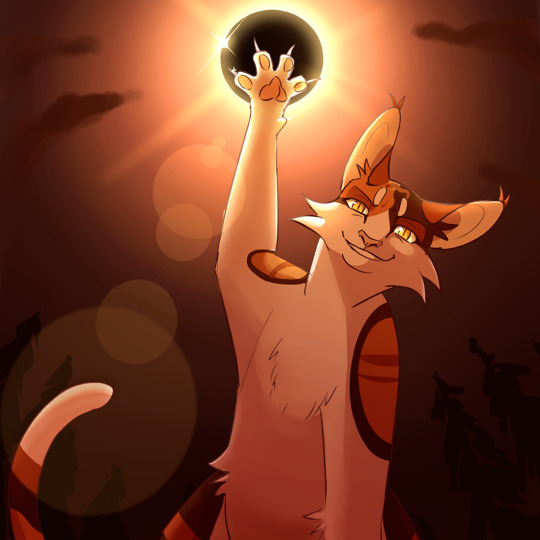
eclipse man for the eclipse day 🌞🌑
52 notes
·
View notes
Text
7. Some bullshit James Frazer made up. (I know he falls under points 1 and 2, but he is solely responsible for so much neopagan bullshit history that deserves his own category.)
For every claim about Pagan survivals in European / North American folk traditions and holidays, it's important to remember that there are at least three layers of cruft on top:
Sixteenth- and seventeenth-century Protestants trying to discredit Catholicism by claiming that it was secretly Pagan
Nineteenth-century Romanticists and Nationalists trying to construct an "authentic" volkisch identity by connecting everything to a remote pre-Christian (pre-Jewish) antiquity, and
Contemporary Neopagans and New Agers who want to maintain these traditions.
#paganism#neopaganism#pagan holidays#pseudohistory#sabbats#the wheel of the year#witchblr#witchcraft#wicca#james frazer#the golden bough
7K notes
·
View notes
Text
I Read The Silmarillion So You Don't Have To, Part Six
Previous part.
Chapter 14: Of Beleriand and its Realms
In which we get a geography lesson.
Had enough political geography yet? I’m not going to summarize this whole chapter, because it’s exactly what it says on the tin: it describes the realms of Beleriand. It is impossible to make sense of this chapter without looking at the map. And most of it is information that we already know. For the sake of being complete, and of helping myself keep track of all this information, here’s what’s important:
The northern land where the Noldor live is called Hísilomé (in Quenya) or Hithlum (in Sindarin), both of which mean “Land of Mist.” It’s called that because of all the smoke that comes from Angband blows over it. It’s co-ruled by Fingolfin and his son Fingon.
In the westernmost part of Beleriand, on the coast, is a land called Nevrast. Turgon, Fingolfin’s other son, rules there. It’s completely surrounded by mountains in a kind of triangular shape, which is not how mountains work. Its population consists of an even mix of Noldor and Sindar.
Remember how I said there were two Minas Tiriths? The one we know is the second one, in Gondor, many thousands of years later. The first one is a watchtower built in a small mountain pass on the River Sirion, here in Beleriand. Finrod built it, but he leaves it in the care of his brother Orodreth. (“Minas Tirith” just means “guard tower” in Sindarin, so that’s why there’s two fortresses with that name.)
The River Sirion flows south. West of it is the realm of Nargothrond, ruled by Finrod, and east of it is Doriath, the forest ruled by King Thingol of the Sindar.
The eagles live on a chain of mountains called the Crissaegrim. (Yes, the name of the best sword in Castlevania: Symphony of the Night is a reference to this! )
In the eastern part of Beleriand is the River Gelion, running parallel to the Sirion. It has six rivers that flow into it. That land is called Ossiriand, and the Green Elves live there. Directly north is Thargelion, where Caranthir (another one of Fëanor’s sons) has his castle.
In the northeast is Lothlann, which is the plain that’s most exposed to Morgoth. Maedhros has his castle there.
I feel like this chapter should have come before the last one. It describes a bunch of places which have already been referenced in relation to each other. So, why are they being described now, after they’ve already become relevant to the story? Like, for example, the Thangorodrim. In this chapter, we’re told that the Thangorodrim are mountains made out of the refuse from Morgoth’s excavations while he was building his fortress. That would have been nice to know before Mædhros was nailed to the face of them. Back in the last chapter, the text just sort of assumed that we already know what the Thangorodrim are. I gathered from the context that they’re mountains and that they’re connected to Morgoth. I guess that’s all one really needs to know, right? No story actually needs this detailed a description of the geography… but this book is 300 pages of straight infodumping. So, we get all the geography, and out-of-order.
Okay, now that that’s over, let’s move on to something interesting!
Chapter 15: Of the Noldor in Beleriand
In which a legendary city is built, and Thingol hears all the dirt on the Noldor.
Remember Turgon? He’s Fingolfin’s son and Fingon’s brother, and he received a prophetic dream from Ulmo, the Vala of Water. The dream led him to finding a hidden valley in the north of Beleriand. Feeling homesick for Valinor, Turgon decided to build a city on the hill in the center of the valley, which would be like a New Tirion — the original city of the Noldor, replicated in Middle Earth!
Turgon brought many of the most skilled Noldor to the valley to build the city, and then ditched them to live comfortably in Nevrast while they did the work for him. After fifty-two years, the city was complete. Turgon named it Ondolindë, which means “The Rock of the Music of Water” in Quenya. But it’s better known by its Sindarin name, Gondolin.
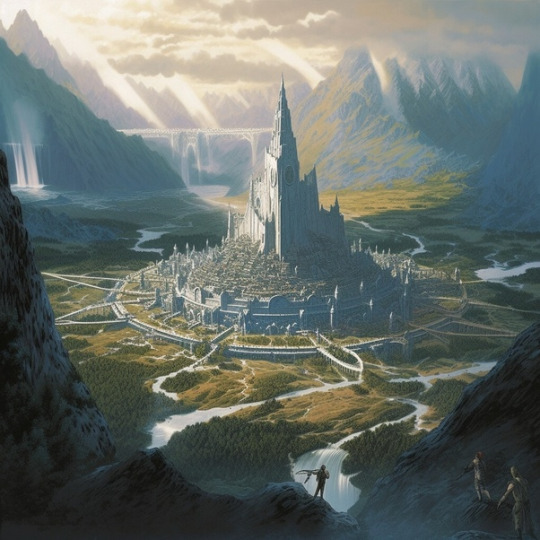
The Hidden City of Gondolin by Aesthetica
Gondonlin is the Elven City (which is why it’s kind of surprising to learn that it’s a copy of an even greater one). It’s gorgeous and bright white, with beautiful fountains and gardens. The giant tower in the middle is Turgon’s palace, and in it he creates images of the Two Trees of Valinor, wrought out of literal silver and gold; the gold one is called Glingal, and the silver one is called Belthil.
The most wondrous treasure of Gondolin is, of course, Turgon’s beautiful daughter Idril Celebrindal. Like Galadriel, she almost has the light of the Gold Tree, Laurelin, in her hair. So, that makes her one of the prettiest Elves alive.
Ulmo promises to protect Gondolin, and ensure that no one will ever be able to find it against his will. But he straight-up tells Turgon not to get too attached to Gondolin. (Actually, he says “the work of thy hands” — lol, Turgon did nothing to help build it.) Ulmo also tells Turgon that his little safe-haven isn’t going to protect him from the Curse, so, he can expect treachery within Gondolin’s walls at some point. The only hope is going to be someone who comes from the west.
What Could Possibly Go Wrong?
A third of the Noldor and even more of the Sindar pass secretly into Gondolin, apparently disappearing overnight. (Nevrast is completely abandoned) Then the gates are shut.
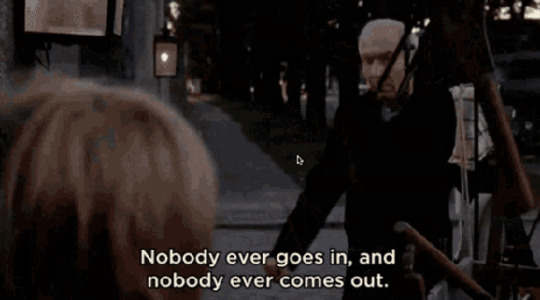
Meanwhile, Galadriel is enjoying her life in the court of Thingol. Remember, she’s one of the only Noldor Elves who’s allowed to be there, past the magic wall. She has long talks with Queen Melian, the Maia, about Valinor. But Galadriel refuses to say anything about how and why the Two Trees died. Melian can tell that something’s wrong, and asks Galadriel what happened. Galadriel says that she wants to put the past behind her, and try to have some hope for the future.
Melian presses her — she knows better than to think, as everyone else does, that the Noldor were sent by the Valar to swoop in and save her people from being assaulted by Orcs. She notes that the Noldor don’t speak of the Valar at all; they just sort of pretend that the Valar don’t exist. From that, she concludes that the Noldor aren’t messengers, they’re exiles. Something went badly wrong.
Galadriel caves, and tells Melian about the Silmarils, about how Morgoth stole them, about the death of Finwë, and about how the Noldor left Valinor willingly despite the Valar not wanting them to leave. She neglects to mention any of the worse stuff, like the Oath that Fëanor’s sons took, or the kinslaying, or the Curse, or the burning of the ships. Melian senses that she’s still holding back information. She doesn’t press Galadriel any more, but she does tell her husband Thingol about the Silmarils.
Only Melian is really able to put two and two together, and realize just what a big-ass deal the Silmarils really are. They contain the last remaining Light of Valinor, and if Morgoth has them, then any attempt at recovering them is almost inherently pointless. It’s going to take far more power than Elves have to take the fight to him. Fëanor tried that, and now he’s dead, even though he was one of the greatest Elves. If anyone else tries to take on Morgoth, they could risk destroying the world in the process. For better or worse, the fate of Arda is tied up with that of the Silmarils.
Thingol is distraught to hear that Finwë is dead, and figures he was right not to trust the Noldor. The only silver lining is that at least the Noldor will make good allies against Morgoth, because peace with him doesn’t seem to be an option. Melian tells him to be wary of Fëanor’s sons. She could read between the lines and figure out what Galadriel wasn’t telling her. Fëanor’s sons are all guilty of crimes against the Valar, their own families, and even themselves. There’s a lot of unresolved tension between them that’s only dormant for the time being, and it can only get worse from here. Thingol dismisses her concerns. All he cares about is that Fëanor’s sons will give him his best shot at taking down Morgoth. Whatever drama is between them is their business.
Melian and Thingol decide not to speak of this again, but rumor spreads amongst the Sindar about what the Noldor did to get kicked out of Valinor. Many of these rumors are spread by Morgoth. Spreading rumors was how he set the Noldor on their dark path in the first place, and the Sindar were too naïve to know not to believe rumors. Círdan, however, catches wise. He perceives that the rumors are being spread maliciously, but doesn’t think to blame Morgoth. He assumes that the Noldorin princes are spreading rumors to slander each other. He sends messengers to Thingol to tell him about the rumors.
By pure bad luck, Finrod and his brothers happen to be there in Thingol’s court, visiting their sister Galadriel. So, Thingol hears all the rumors while they’re there. He explodes at Finrod for having lied by omission. Finrod protests that he’s never done anything to Thingol, nor have any of the other Noldor. Thingol cooly responds that all the Noldor have blood on their hands for kinslaying, but they don’t try to defend themselves or seek pardon. Finrod has nothing to say to that.
But Angrod, his brother, speaks up. Angrod blames Fëanor for the whole thing. The other Noldor are really the victims in this situation, he claims, because they were intoxicated by Fëanor’s words, and then Fëanor abandoned them to freeze to death. The reason why Thingol hasn’t heard any of this before is because it’s an act of treason against the Noldor to talk about it. Surely, Thingol can understand that?
Melian is less than impressed. She points out that, according to Angrod’s own account, Mandos doomed all the Noldor. That means that he and his siblings are just as damned as the rest of them. They're all affected by the Curse.
Thingol is silent for a moment. Then he tells Angrod and co. to get out of his house. He’s not going to shut them out forever, because they’re family. He’s also going to maintain his friendship with Fingolfin’s people, because he needs them to take down Morgoth. But, he refuses to hear their language be spoken in his presence, and he commands that none of the Sindar use it, either. Anyone who speaks Quenya will be branded a kinslayer.
So, now you know why Sindarin is the dominant Elven language in Middle-earth.
That sort of puts a damper on Quenya; it seems like such a magical and elevated language, but now it’s associated with the Noldor’s crimes. I suppose that makes sense, if the Noldor are the ones who primarily speak it. But it also seems a bit draconian for Thingol to consider someone guilty of a serious crime just for speaking Quenya.
Quenya therefore ceases to be a spoken language, and becomes mainly used for writing lore or singing old songs. It’s the Elvish version of Latin.
After that, things become a little awkward for Galadriel in Thingol’s court, so she leaves it and comes to live with her brother Finrod in Nargothrond. She asks him why he hasn’t taken a wife yet. Finrod gets a flash of premonition, and tells her that nothing of his realm will remain to be inherited by a son. But the real truth is that he left his true love, Amarië, in Valinor.
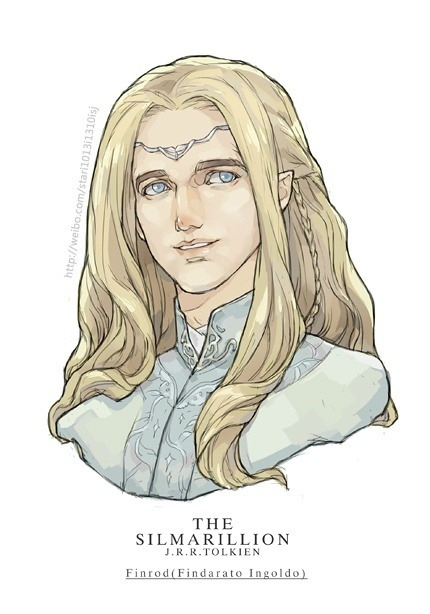
Finrod by _star热爱生活呀巴扎嘿
Chapter 16: Of Maeglin
In which we meet an edgy bad-boy Elf.
Did you remember that Fingolfin had a daughter? It’s okay, I didn’t either. Her name is Aredhel Ar-Feiniel, and she’s known as the White Lady. She lives with Turgon, her brother, in Nevrast. She follows him to Gondolin, but she doesn’t really like it there. She prefers to wander freely in forests or ride horses in the fields, and she can’t do that if she’s effectively imprisoned by mountains and high walls on all sides.
Two hundred years pass (which I’m guessing is like twenty in elf years), and she finally asks Turgon if she can leave. Turgon doesn’t want her to leave. If anyone leaves Gondolin, then that risks revealing its existence to everyone else in the world, and that would be bad. Eventually he gives in, but tells her that she’s only allowed to meet with Fingon, their brother. Aredhel takes offense at this. She’s Turgon’s sister, not his lackey, and he has no right to tell her where to go or what to do. She leaves, and Turgon tells three of his lords to go with her to protect her, with the condition that they come straight back.
Aredhel immediately decides not to go see Fingon. She wants to find the sons of Fëanor (Maedhros, Caranthir, and co.), because they’re her friends. She tries to cut through the forest of Doriath, but the Sindar turn her away, because Thingol hates the Noldor now. She has to go around the long way. That way is dangerous, and polluted with poisonous water and evil creatures left behind by Morgoth and Ungoliant. Aredhel gets lost, and her escorts barely escape with their lives. They make it back to Gondolin, but have to give the terrible news to Turgon that they lost their charge along the way.
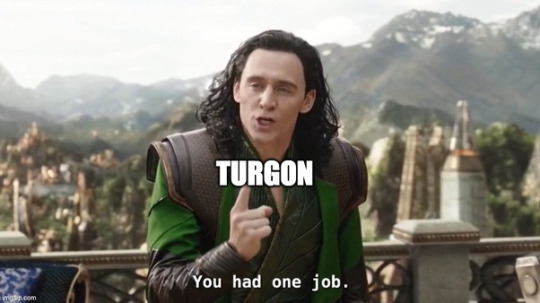
Turgon is grief-stricken and very, very frustrated. Aredhel survives, though, and ends up in Himlad, the land of Fëanor’s sons Celegorm and Curufin. They’re away, traveling further east with their brother Caranthir, but Aredhel is welcomed by Celegorm’s people.
Aredhel enjoys herself for a while, wandering in the forests like she used to, but a year passes and Celegorm still hasn’t come back. She starts wandering further and further, until she ends up in a small forest on the eastern edge of Doriath.
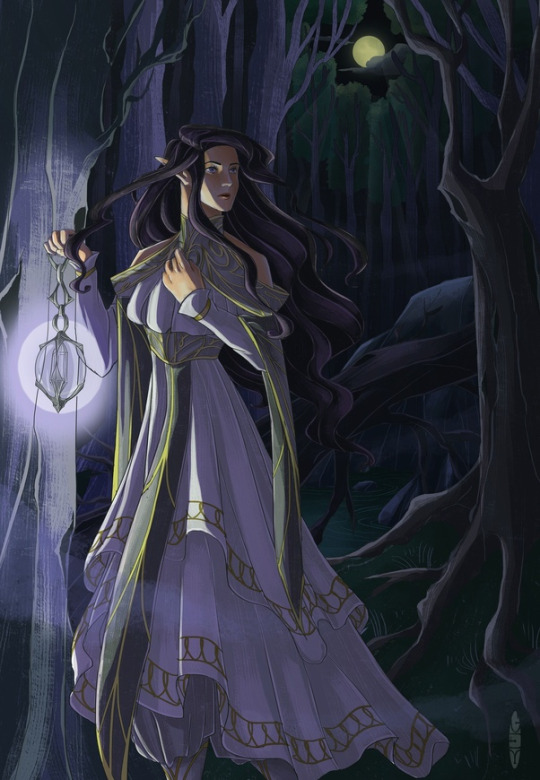
Aredhel lost in the dark forest by @gemennair
This forest is the darkest of all the forests in Beleriand, and it’s inhabited by an elf called Eöl, known as the Dark Elf. Eöl isn’t actually a Dark Elf (Moriquendi); he’s one of the Sindar, but he left Doriath when the magic wall went up. Now he’s basically nocturnal. He blames the Noldor for the return of Morgoth. He mostly doesn’t interact with other Elves, but he does like Dwarves, and gives them information about the Elves when they ask. The Dwarves taught him metalwork in exchange, and he designed a special kind of armor that’s thin and light and yet repels all weapons. It’s jet black, and he wears it all the time.
Skulking in the shadows, Eöl sees Aredhel enter his forest, and he lusts after her. He enchants the forest so that she can’t find her way out, and the forest always turns her towards the center. (Kind of like the Old Forest does to the Hobbits while they’re trying to pass through it in Fellowship.) When she finally arrives at Eöl’s house, tired from wandering, he welcomes her in. And that was the last her family heard of her for a long time.
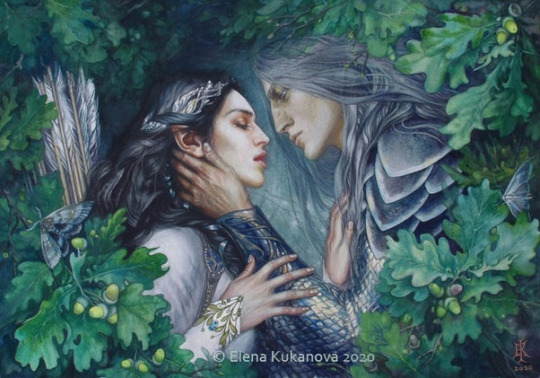
Aredhel and Eöl by Elena Kukanova
It’s unknown exactly how Aredhel responded to Eöl’s intent to marry her. Maybe she fell in love with this edgy bad-boy elf in his spooky forest. But she landed in kind of the same situation that she was in back in Gondolin. Eöl lets her wander, at least, but only at night. He also forbids her from seeking out the other Noldor, and the sons of Fëanor in particular, which is what she wanted to do in the first place. Honestly, their relationship reminds me superficially of Hades and Persephone.
Eöl and Aredhel have a son. Secretly, Aredhel gives him a name in her forbidden native tongue of Quenya — Lómion, which means “Child of the Twilight.” Eöl doesn’t give him a name until he turns twelve, and that name is Maeglin, which means “sharp glance.” Maeglin grows up to resemble the Noldor, but he is more like his father in temperament.
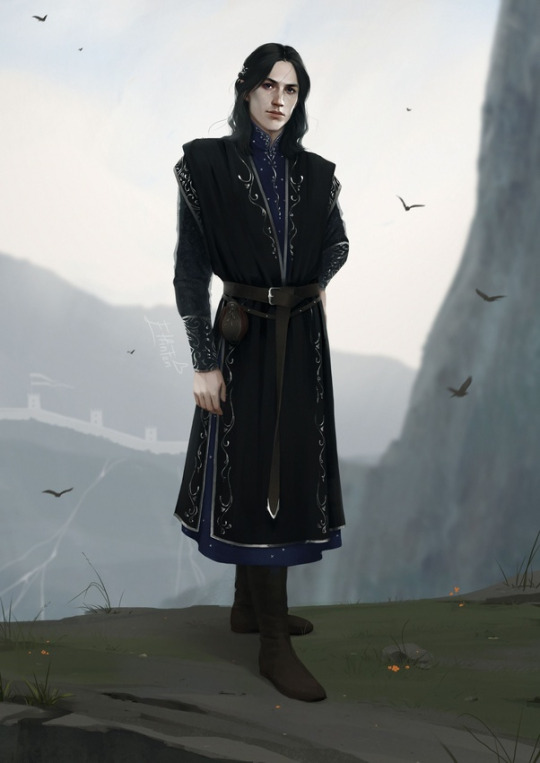
Maeglin by @elfinfen
His father takes him to meet the Dwarves, who teach him mining, smithing, and metalwork. But Maeglin has a special relationship with his mother, and enjoys hearing her tales of Valinor and the House of Fingolfin. He especially likes hearing about Turgon and Gondolin.
In telling all these stories, Aredhel realizes just how much she misses Gondonlin. She wonders how she could have left in the first place. After such a long time in the dark shadows of the forest, the bright walls and fountains of Gondonlin seem lovely. But she refuses to tell Maeglin where Gondolin is, because that is such an important secret.
Eöl is also mad that Maeglin wants to meet his Noldor relatives. He’s an old enough Sinda to still identify himself as a member of the Teleri, and therefore, he thinks of his distant relatives in Valinor as his own people. He forbids Maeglin from seeking out the Noldor for the same reason that King Thingol banned Quenya — he takes the Noldor’s crime of kinslaying personally. (He probably should have thought of that before deciding to marry Aredhel, but whatever.) Maeglin, like any edgy teenager, does not take this well. He stops going to visit the Dwarves with his father, and Eöl starts to distrust his own son.
One summer, when Eöl is gone on one of his visits to the Dwarves, Maeglin suggests to his mother that they go to Gondolin. What’s the point of sticking around? She wants to see her people again, and Maeglin has learned all he can from Eöl. There’s no sense in remaining trapped in a dark forest with nothing else to do. So, they up and leave.
When Eöl gets back, he is furious to find them gone. Despite his hatred of the sun, he chases after them, but he’s waylaid by Curufin, one of Fëanor’s sons. Curufin asks what he’s doing there. Eöl lies, saying that his wife and son were on a casual visit to their relatives, and that it only makes sense that he should be with them. Curufin sees right through him, and tells him that they’re already gone. He gives Eöl permission to pass through, but tells him that the sooner he leaves, the better.
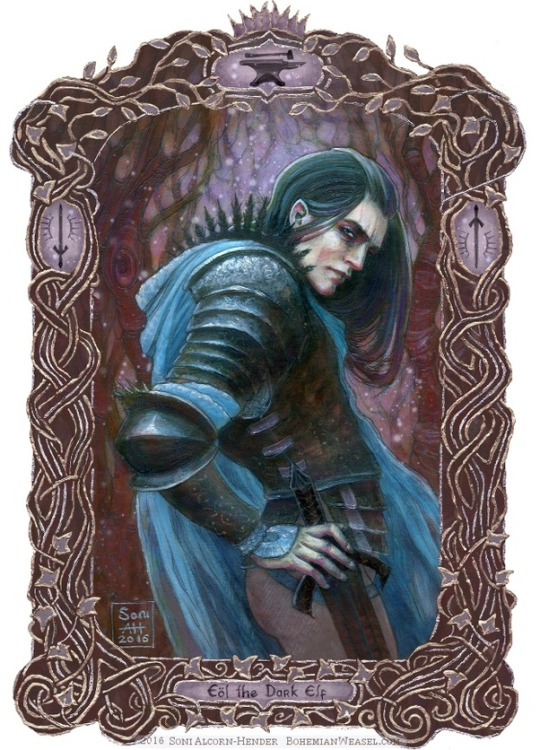
Eöl by @bohemianweasel
Eöl snipes that this isn’t the proper way to treat a kinsman. Curufin replies that it’s pretty rich for Eöl to ride upon his wife’s title when he’s been keeping her imprisoned in a forest for decades. If he wants the honor due to a kinsman, he should have acted like one. Curufin also gives Eöl a warning: He should return to his forest now. If he pursues his family, he’ll never come back.
If Eöl hated the Noldor before, now he really hates the Noldor.
As you probably guessed, he decides to chase after his family, and he eventually catches up with them just as they’re about to enter Gondolin. Gondolin, the secret city that no one is supposed to know the entrance to.
You can imagine how Turgon must have reacted when he sees his sister come back with a son in tow. She went out for a simple family visit, and returned with an adult child that she had with some creepy dude in a dark forest. But he’s happier to have her back and see her safe. Turgon also takes a liking to Maeglin, and thinks that he’s worthy to be one of the Princes of the Noldor. Maeglin swears fealty to Turgon.
Gondolin surpasses Maeglin’s wildest dreams. After having spent nearly his whole life in a dark forest, Gondolin is a whirl of light and color and interesting people. But more than anything else, he’s attracted to the king’s daughter, Idril… his first cousin.
Meanwhile, Eöl finds his way in. You know, the one thing Turgon didn’t want to have happen. Because he claims to be Aredhel’s husband, the guards restrain him (with difficulty) and bring him to Turgon. Aredhel is aghast that her abusive husband followed her all the way to her secret safe haven, but she tells the guards not to kill him. After all, he is telling the truth, and he’s still Maeglin’s father.
Eöl stands “proud and sullen” before Turgon, but despite his bad attitude, Turgon treats him honorably. Unlike Curufin, he accepts Eöl as a kinsman, and tells him that he’s welcome to stay in the city so long as he doesn’t leave it. Eöl goes on a rant about how this is the Tereri’s land, and (paraphrased) “you colonizing kinslayers don’t have any right to tell me where I can and can’t go, and how dare you keep my son from me!” He commands Maeglin to come with him, but Maeglin huffs and says nothing.
Turgon retorts that the only reason why Eöl’s woods are safe is because the Noldor protect the land from Orcs, so, he owes them. If it weren’t for the Noldor, he’d be Morgoth’s slave in Angband. And besides, you can’t argue with a king in his own castle. Either Eöl will live in Gondolin, or he’ll die there, and Maeglin will get the same choice.
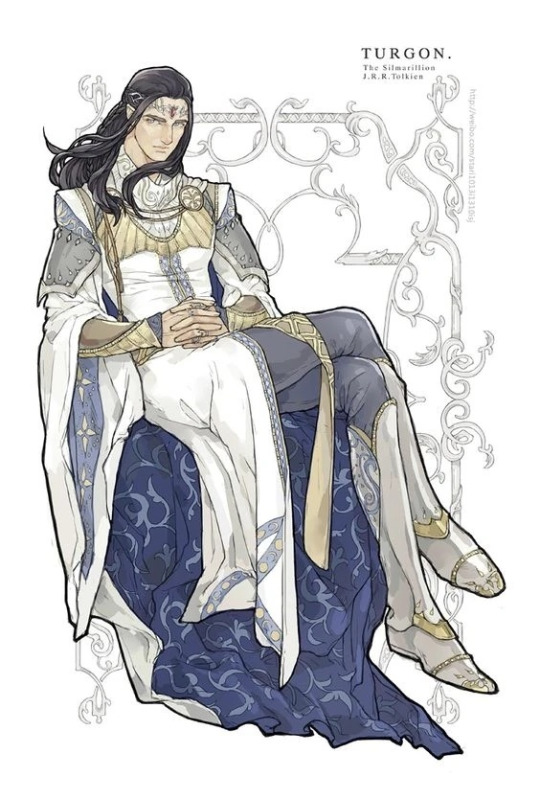
Turgon by _star热爱生活呀巴扎嘿
Eöl just stands silently for several minutes. You could cut the tension with a knife. Then, in a sudden motion, he takes a javelin that he had concealed in his cloak and throws it straight at Maeglin. If he’s gonna die there, he’s taking Maeglin with him. Aredhel jumps in front of her son, and the javelin hits her in the shoulder.
Eöl is instantly beset by guards, who bind him and lead him away. Maeglin is just silent through all this, not knowing how to react. Aredhel and Idril both try to convince Turgon to be merciful during Eöl’s trial, but that night, Aredhel dies. The tip of the javelin was poisoned. Therefore, Turgon shows Eöl no mercy. He sentences him to die by being thrown from the top of the tower. As he falls, he curses Maeglin to have all his efforts fail and to suffer the same fate.
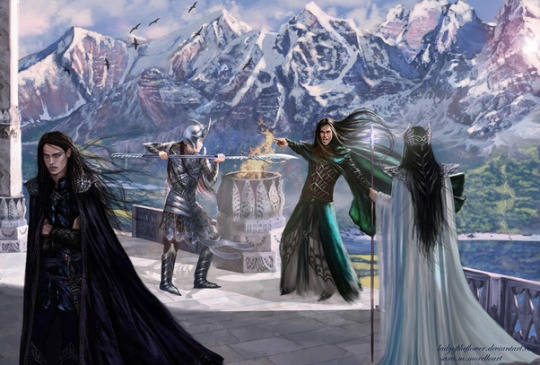
Caragdur - the same fate by SaMo-art
Most of the people of Gondolin believe justice has been served, but Idril is troubled. From that day onward, she distrusts Maeglin.
For the time being, Maeglin’s life is good. He rises through the ranks of Turgon’s court, and Turgon favors him. He finds many valuable metals in the mountains around Gondolin, and forges powerful steel weapons for the people of Gondolin. Maeglin is also wise, tough, and valiant in battle, making him a true asset to Gondolin. All is well… for now.
The only problem is that he’s still in love with Idril, who’s his first cousin. The Noldor don’t marry their cousins, and until now, none of them have wanted to. Idril also doesn’t love him; she can’t help but associate him with his insane father, and she thinks there’s a darkness in him. Somehow, he’s affected by the Curse. Slowly, Maeglin’s love for Idril festers into resentment. I’m sure that won’t cause any problems down the line.
Chapter 17: Of the Coming of Men into the West
In which the Men finally arrive in Beleriand.
It’s been three hundred years since the Noldor first arrived in Beleriand. One day, Finrod Felagund is out exploring the countryside, and he sees cheery campfires and hears the sound of singing. That’s weird, he thinks, the Green Elves who live here don’t light campfires or sing at night. He worries that they might be Orcs, and sneaks closer, but he doesn’t recognize their language. They’re humans, the first Men to enter Beleriand. These Men are the people of Bëor the Old, and they’re singing because they believe that they’ve finally found a paradisal land without fear of Morgoth. Finrod finds them endearing.
When they go to sleep, Finrod sneaks further into their camp, picks up a crudely-carven harp, and begins to play. The Men wake up and are spellbound by the beauty of the faerie king’s music. Finrod sings about the creation of the world, and about Valinor. Although the Men don’t understand his language, images of what he’s singing appear in their minds, and so they learn about how the world was created.
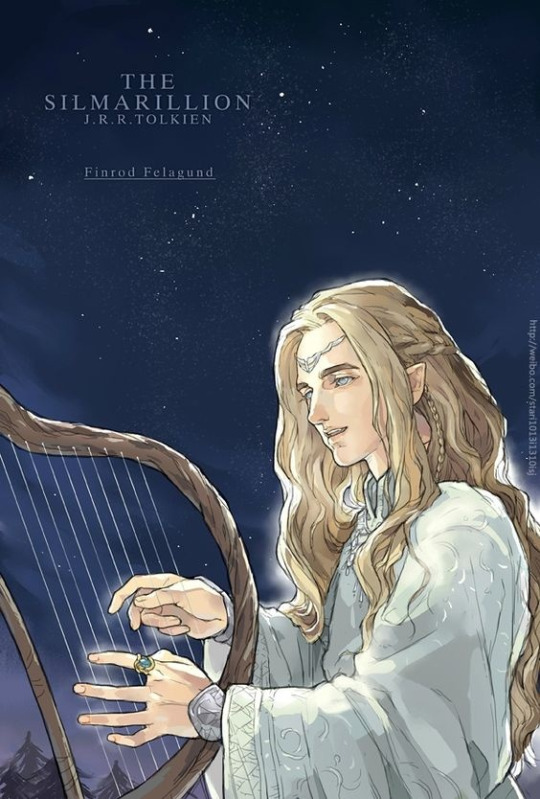
By _star热爱生活呀巴扎嘿
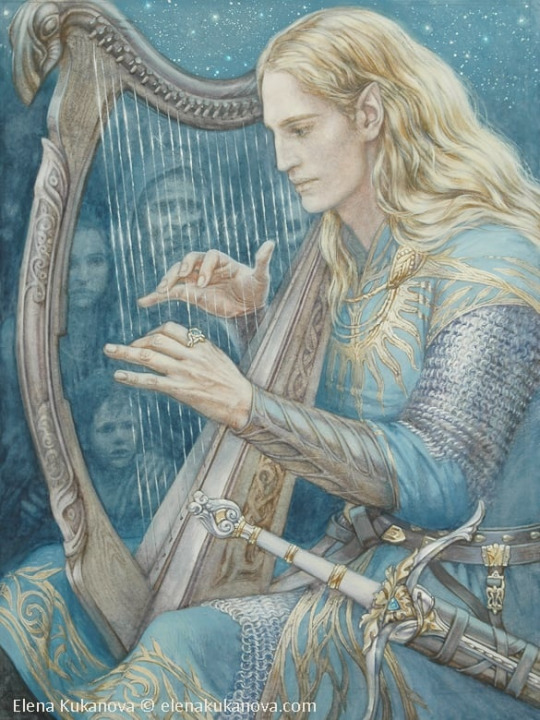
By Elena Kukanova
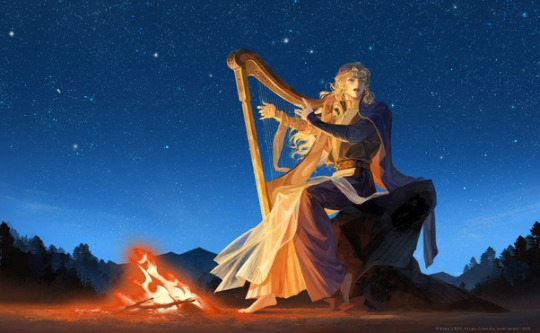
By pan_brooke
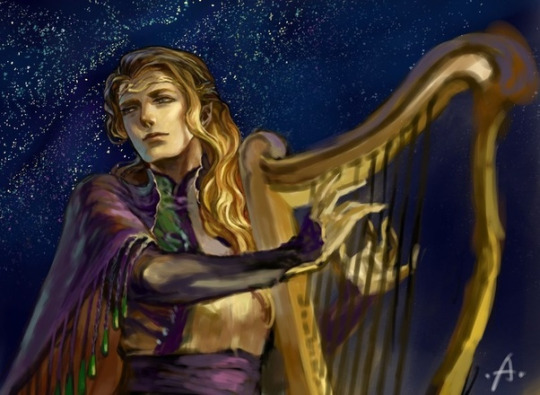
By @pansen1802
(I couldn’t pick just one image for this scene. There are so many good ones!)
After all the Elf Drama that we’ve had to sit through, it’s easy to forget what the Elves really are. They’re the Fair Folk. This scene really speaks to their folkloric roots.
At first, the Men think that Finrod is a Vala, which they’ve heard of. Finrod decides to stay with the Men for some time, in order to teach them things. They call him Nómin, which in their language means “the Wise.” Finrod can understand the Men’s speech realtively easily, because he can read their minds, and because they learned how to speak from the Dark Elves (the Avari) in the east. (This is important because it means that all of the Children of Ilúvatar’s languages descend from the original language of the Elves. It’s the Proto-Indo-European of Middle-earth.)
Finrod asks Bëor why the Men are there. Bëor doesn’t really know, because Men have short lives, and it’s taken many generations for them to get this far. Whatever it was they were fleeing in the first place, it was bad, and they’ve heard enough about Valinor to know that there’s Light in the west. Morgoth did something to corrupt them, as he always does. In fact, as soon as Men arrived in Middle-earth, Morgoth considered this such a big deal that he abandoned the war in Beleriand, putting Sauron in charge of it. Morgoth immediately went to go mess with the Men. Therefore, there’s some human equivalent of the Noldor’s Original Sin of kinslaying. But what it is, no one knows. Bëor tells Finrod that there are more Men heading westwards.
Some of the Green Elves send messengers to Finrod to ask about the Men. They’re not happy that these refugees of an unknown race are moving onto their land. They consider Men their enemies, because the Men cut down trees and kill animals. They tell Finrod to tell the Men to either go back the way they came, or move forward.
Finrod advises the Men to keep moving. They head further West, so that they’re just east of Doriath and just south of Eöl’s dark forest. This is the land that Amrod and Amras, the twin sons of Fëanor, rule over. This land is now called Estolad, “Encampment.” By that point, a year has passed since Finrod first found the Men, and he decides to return home to his own palace, Nargothrond. Bëor begs to come with him and serve him, so he does, leaving his son in charge of the Men.
Soon after, more groups of Men make their way into Beleriand. They settle in whatever little niches they can find amongst the lands that the Elves had divided up amongst themselves. The Elves are extremely interested in the Men, whom they call Edain, “the Second People.” Both Noldor and Sindar alike go to see them. They send messengers to welcome the Men, and some of the Men go to serve in the courts of the Elven kings. Overtime, more and more of them go to serve the Elves.
Thingol, however, is unhappy about the coming of Men. He already was not pleased about the arrival of the Noldor in his lands, even before he found out that they were kinslayers and banned their language. Now, a whole separate group of refugees is invading his kingdom from the other direction, dividing it into even smaller portions. What’s worse, he keeps having troubling dreams about them. The only person he’s willing to talk to about this is Finrod. Thingol decrees that the Men are only allowed to live in the north of Beleriand, and that the Elf lords that they serve are responsible for them. None of the Men are allowed to come into Doriath.
Melian knows that the arrival of Men means that big changes are coming. She whispers to Galadriel that one of the Men will eventually break through her magic wall, because the power of that Man’s destiny will overcome her own. People will sing about that event until the distant future, when Middle-earth is unrecognizable.
Many of the Men are still interested in getting to Valinor, so they can live with the Gods. They’re frustrated and disappointed to know that Valinor is even further west, across the sea. The only God that’s there with them is Morgoth, the Lord of the Dark. (This echoes the Christian idea that God is removed from the world, while Satan is here on earth with us and troubles us while we’re alive.) The Men basically have two options: to try to get across the sea to Valinor, or to try to help the Elves defeat Morgoth.
One Man, Amlach, makes the bold suggestion that there is no Valinor, and that the Elves have been lying to them. The Men have no proof that the Gods exist, and they don’t even have any proof that Morgoth exists beyond the vague evil that their great-grandfathers fled. Maybe it’s the Elves and not Morgoth who want to take over the world! Sound familiar? These are basically all the same conspiracy theories that drove the Noldor out of Valinor.
It’s darkly telling that the source of evil in The Silmarillion is conspiracy theories, lies, misunderstandings, and miscommunications. Morgoth didn’t force the Noldor to kill their relatives — they did that on their own. Now, he’s trying the same tactic all over again with the Men. All he needs to do is sew distrust amongst the people, so that they’ll attack each other instead of him, and destroy everything in the process. This speaks to Tolkien’s general theme about the power of language, but it also seems particularly poignant right now.
Morgoth’s not done yet, though. Despite his best efforts to sew distrust, the friendship between Elves and Men still holds. He decides to try a more direct approach, and sends Orcs to attack a group of Men. The Men are a lot weaker against the Orcs than the Elves are, and they barely survive the siege. Caranthir arrives with the cavalry at the last minute to drive back the Orcs. Caranthir offers the Men protection in his lands in the north. Their leader, Haleth, refuses; she doesn’t want to live under someone else’s rule. She tells Caranthir that she’d rather go further west. She gathers what’s left of her people, and brings them to Estolad.
Haleth leads her people further and further west. They travel through the land north of Doriath, the same poisonous land where Aredhel originally got lost. Many of her people die, and the survivors regret making the journey, but it’s too late to go back now. She tries to restore their way of life best she can.
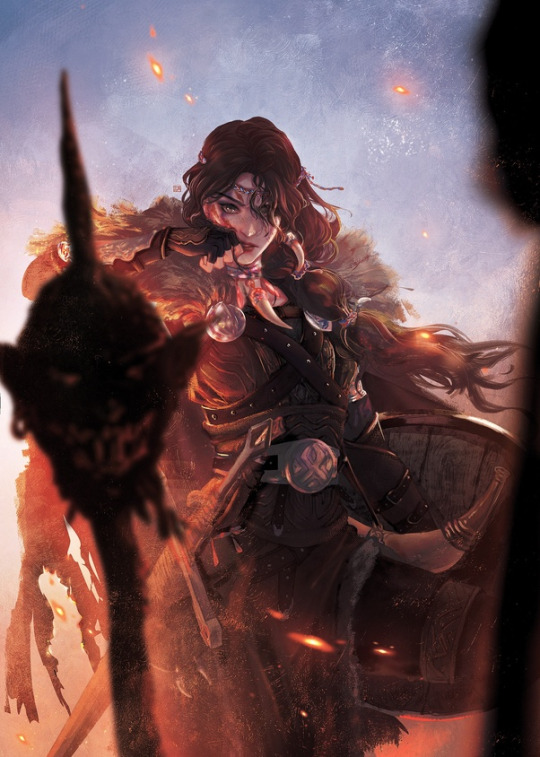
Haleth by @yidanyuan
Now, Haleth and her people are living in a forest called Brethil, northwest of Doriath. This is too close for Thingol’s comfort. Finrod vouches for Haleth and her people, and tells Thingol about the hell that they went through. Thingol reluctantly permits them to live in the forest, so long as they remain outside the magic wall and help defend the forest from Orcs. He worries that the Men and Orcs could become allies and try to attack Doriath. Haleth is disturbed that Thingol would let that thought cross his mind; why would she ally herself with Orcs, after Orcs laid siege to her village and killed her father and brother? If Thingol wants her to kill Orcs, he doesn’t need to tell her twice. She remains in Brethil until she dies, at which point her people build a great barrow for her.
Overtime, the Men learn Sindarin. They remain enthralled by the Elves, and want to learn as much of their lore as possible. But the Elves recognize that Men need to have kingdoms and leaders of their own. The different ethnic groups of Men are therefore given their own lands by the Elven Kings. In addition to Haleth and her people, there are two other important kings of Men:
One of the kings of Men is Hador Lórindol (“Goldenhead”), a member of Fingolfin’s court, whom Fingolfin is fond of. Hador’s people speak both Sindarin and their own language, which eventually evolves into the language of Númenor (which in turn evolves into Westron, the in-universe language that The Lord of the Rings and The Hobbit are written in, rendered as Modern English by our good Professor Tolkien). One of Hador’s sons is named Galdor. Galdor has two sons, Hurin and Huor. They each have a son — Húrin’s son is Túrin, and Huor’s son is Tuor. Tuor has a son, Earendil, whose name should ring a bell. Húrin, Huor, Túrin, and Tuor are all going to be important characters going forward in The Silmarillion. Earendil is the father of Elrond and his brother Elros, and much further down the line, Aragorn will be born from his lineage.
The other important king of Men is Boromir — no, not that one, this one is the son of Bëor the Old. One of his great-great-grandchildren is Morwen, the mother of Túrin, and another one of his great-great-grandchildren is Rían, the mother of Tuor. A third great-great-grandchild is Beren, who’s also a significant character going forward, and his daughter becomes the wife of Earendil, therefore the many-times-great-grandmother of Aragorn.
TL;DR: These two important kings’ grandchildren will marry each other, and their descendants will be the Kings of Numenor, whose line will eventually end with Aragorn. This is where it starts. Also, most of these great-grandchildren are about to become relevant here in the Silm.
Bëor is the first of the Men to die of old age, rather than being killed in battle. The Men are struck by their own mortality. They’re not just vulnerable to being killed — unlike the Elves, they actually have an expiration date. The scope of Men’s lives is barely a hundred years. In the First Age, the Men are practically mayflies. They also have no idea where they go when they die.
Still, the Men that settled in Beleriand are vastly superior to the Men that remained in the East, because they had the opportunity to learn skills, lore, and craftsmanship from the Elves. Also, the men are elevated somewhat just from having seen the Elves’ beautiful faces, because the Elves saw Valinor. Even secondhand, the light of Valinor is just that powerful.
#the silmarillion#the silm#the silm fandom#the silm art#silmarillion#summary#j r r tolkien#the lord of the rings#lotr#finrod#finrod felagund#eol#maeglin#haleth#curufin#celegorm#turgon#aredhel#tolkien#middle earth#elves#tolkien elves#silm elves#beleriand
16 notes
·
View notes
Text
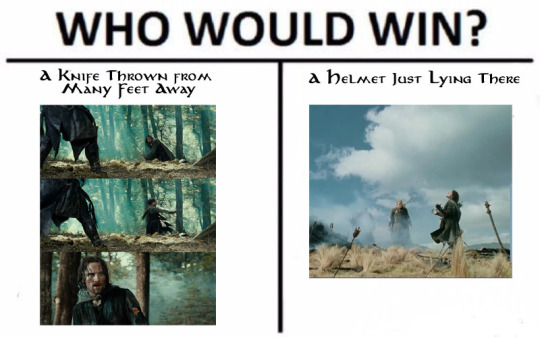
I made this and I am very proud of it.
#viggo mortensen#the lord of the rings#lotr#lotr movies#the two towers#aragorn#lotr memes#did you know in that scene#who would win
122 notes
·
View notes
Text
Weird Medieval Marginalia
So I got to see an epically cool manuscript of Arthurian romance (Beinecke MS 229), written in French sometime in the thirteenth or fourteenth century. It contains many fully illuminated illustrations, but the most interesting thing about it turned out to be the marginalia.
All the big images were the same kinds of scenes of knights fighting, people going into or out of buildings, people lying in bed, occasionally people on boats or talking, etc. After a while they just felt repetitive. But there are these little cartoons in the margins, and they are WILD:

I mean I don’t even know what’s going on here.
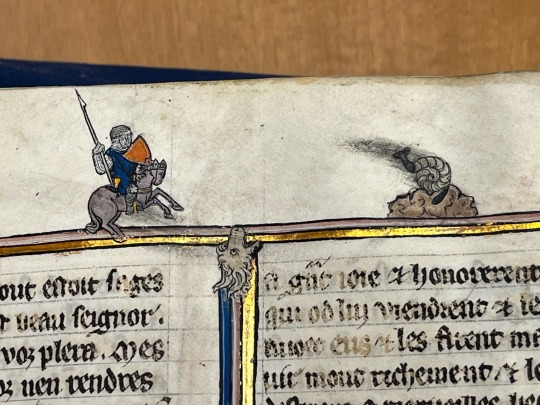
Apparently knights fighting snails appear in a lot of manuscripts. We have no idea what they mean. Might be the medieval version of a meme.
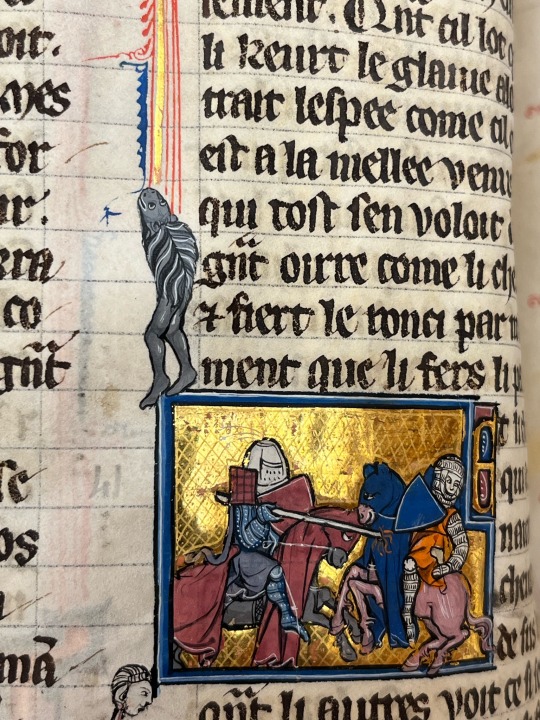
What even is that gray thing?

Knight riding chicken.

Derpy horse.

A very weird-looking unicorn.
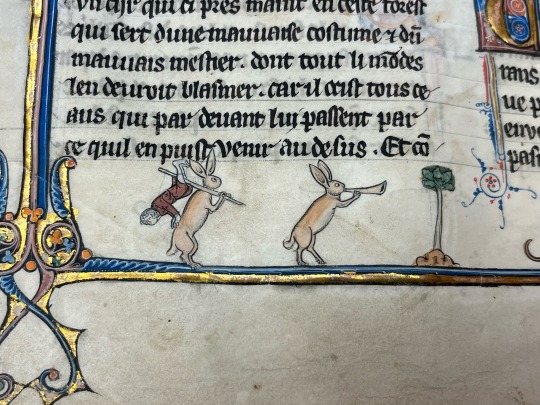
Rabbits hunting people. (RUN AWAY!!! RUN AWAY!!!)
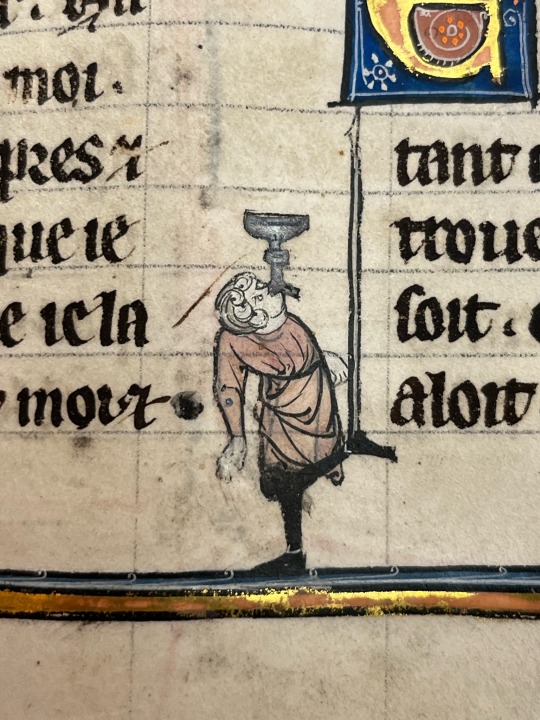
Balancing act.
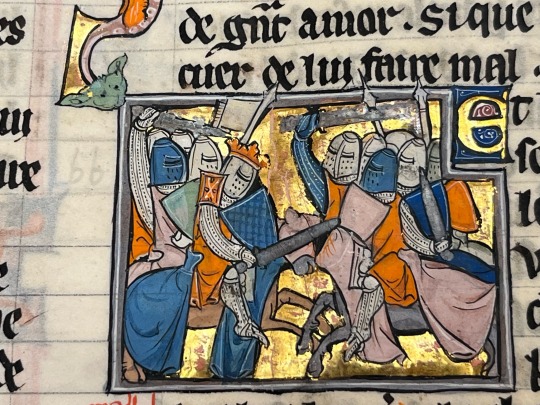
Baby Yoda in the corner there.
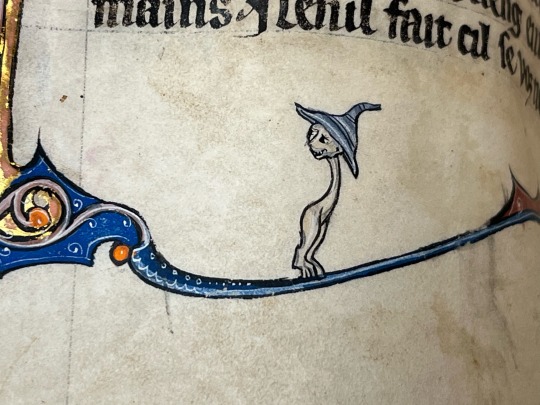
WHAT
There’s plenty more, but that’s as much as I can fit into one post. And this is all one manuscript!
#medieval#medieval art#manuscript#manuscripts#illuminated manuscript#arthurian legend#arthuriana#marginalia#weird shit#knights
115 notes
·
View notes
Text
They deserved to win!
✨💫 TWST JP "ABSOLUTELY BEAUTIFUL" FULL 3D PERFORMANCE 💫✨
I needed to share this video because it was region locked for this year's April Fools, but we finally got the full performance of the VDC tribe in TWST FES last year....😭🫶
WE WON EVERYONE 🎉🎊
LOOK AT THEM!!! 😭🎉🎉

#twisted wonderland#twst#vil schoenheit#rook hunt#epel felmier#kalim al asim#jamil viper#ace trappola#deuce spade#absolutely beautiful
2K notes
·
View notes
Text


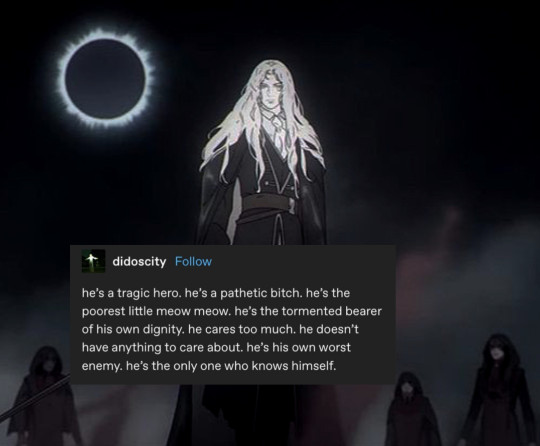
It's MY birthday so I get to post memes about my favourite character ever😤🖐🏻
#alucard#alucard castlevania#alucard netflix#alucard castlevania netflix#castlevania netflix#castlevania#castlevania memes#funny#poor little meow meow#byronic bitch#adrian tepes#adrian fahrenheit tepes
342 notes
·
View notes
Text

Even the iron still fears the rot
#alucard#alucard castlevania#castlevania#castlevania fanart#adrian tepes#adrian fahrenheit tepes#gothic aesthetic#gothic#vampire#beautiful vampire men#vampires#dhampir#religious aesthetic#religious horror#dark aesthetic
580 notes
·
View notes
Text

There’s a sexy sequel this stupid website won’t let me post so dm me if u wanna see it
#Castlevania#castlevania memes#funny#Alucard#alucard castlevania#richter belmont#richter belmont nocturne#castlevania nocturne#castlevania netflix#alucard nocturne#netflix castlevania
1K notes
·
View notes
Text
The king, queen, and their shared harem are also all really into BDSM, which means that they trust each other completely. There are no backstabbings or miscommunications in this court!
fake relationship but its a king and his concubine that was once an amazing soldier but he couldn’t go up the ranks for whatever reason so the king was like listen. hear me out. you can be my strategy dude. u just gotta be okay w walking around shirtless a lot. and soldier dude is like man that’s an UPSIDE and yknow they end up falling in love
206K notes
·
View notes
Text
Gay medieval shenanigans:
This is from The Quest for the Holy Grail by Chrétien de Troyes, translated by David Staines:
When [Percival] did see [the knights] in the open without the woods concealing them, and noticed the jingling hauberks and the bright shining helmets, and beheld the green and the scarlet and the gold and the azure and the silver gleaming in the sun, he found everything most noble and beautiful. [...] "Here I behold the Lord God, I believe, for one of them is so beautiful to behold that the others, so help me God, have not a tenth of his beauty."
[...]
They stopped and he [the knight] galloped toward the young man. Greeting him reassuringly, he said: "Youth, have no fear."
"By the Savior I believe in, I have none," the young man answered. "Are you God?"
"No, I swear"
"Who are you then?"
"I am a knight."
"I never knew a knight before, and never saw one or heard talk of one," the young man said. "But you are more beautiful than God. I wish I were like you, so sparkling and so formed."
TL;DR: Percival sees a knight for the first time, and thinks he's so pretty that when the knight comes up to talk to him, the first thing Percival says is, "Are you God?"
That's maybe the gayest thing I've read in medieval literature so far. And I've read this:
There on the king's bed, they could see
asleep, the knight. How the king ran
up to the bed, to embrace this man,
kiss him, a hundred times and more!
--Marie de France, "Bisclavret"
Also @prokopetz was right, the real deal is Monty-Python-levels of weird and funny.
#i know the point is that percival is just enamored with the idea of knighthood#but i mean come on#he thinks the knight is so freaking gorgeous that he must be god#i'll take things straight men don't say for 200 alex#medieval#medieval romances#medieval studies#medieval romance#arthurian#arthurian legend#percival#knights#the knights of the round table#the knights of camelot#medieval literature#lgbtq#lgbtq history#lgbtq literature#queer reading#arthuriana#bisclavret#marie de france#gay literature
6 notes
·
View notes